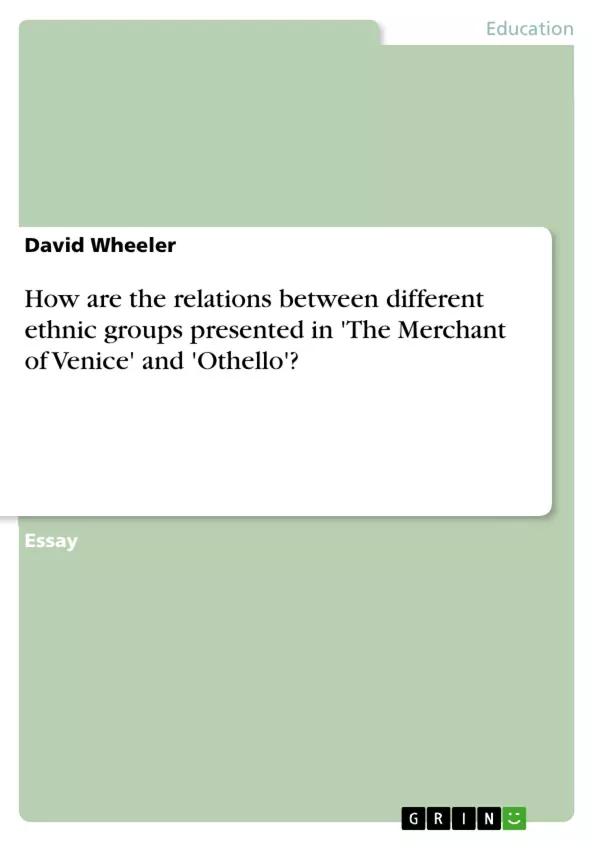What Iago and Roderigo call ‘unnatural’ and unjust only reveals, ironically, how humanly unnatural and morally unjust they are. Racism is so reviled by Shakespeare that, in Iago, he presents one of the moist vividly ugly and alarming life-sized portraits of unequivocal racist hatred of black people in literature. It is true that Brabantio reacts with horror at the thought of Othello marrying his daughter: Iago is clever enough to tap into this primal and illogical fear of miscegenation, but Othello’s first appearance and the way Shakespeare presents him as a well-spoken, articulate and persuasive human being demonstrates that Shakespeare does not endorse any stereotypical view of non-white people at all. In Act One, scene two Shakespeare portrays Othello as calm, measured and sensitive - hardly the “black ram” that Iago has so crudely referred to. In fact, Shakespeare’s presentation of Othello highlights the ironic untruthfulness of Iago’s words. He is much more than the “Barbary horse” that Iago calls him (Act one, scene one, 113). Shakespeare presents Iago as the character with the most psychological problems. This is not just a question of his racism - it is also his obsessive pursuit of Othello’s downfall and his cynical, debased attitude to life. Iago’s speech throughout the play is full of disgusting animal images - this shows us more about his conception of what it is to be human than it does about Othello and other non-Europeans. Samuel Taylor Coleridge (quoted in Kermode, page) wrote about Iago’s “motiveless malignity”, but that is not strictly true: Iago does give two reasons for his hatred of the Moor - at the end of the opening scene of the play he expresses his anger at being passed over for promotion to lieutenant and at the end of Act One, scene three he says that he suspects that Othello has had sex with Emilia, Iago’s wife: “It is thought abroad that twixt my sheets? He has done my office.” (lines 369 - 370). Therefore, Iago does have clear motives. However, that does not explain the sheer joy and relish Iago feels at triumphing over Othello. But even this sadistic enjoyment of destroying other people’s lives is not inherently racist: he destroys the lives of all the characters in the play - without a hint of remorse - white and black, Venetian and non-Venetian. Iago is a bully - and he bullies Othello because of his color, but he might just as easily have bullied him about his age.
Inhaltsverzeichnis (Table of Contents)
- Introduction
- Othello
- Othello and the Colour of his Skin
- Iago's Racism
- Othello and the Problem of Venetian Society
- The Merchant of Venice
- Anti-Semitism in The Merchant of Venice
- Shylock's humanity
- Shylock and the Trial Scene
- Conclusion
Zielsetzung und Themenschwerpunkte (Objectives and Key Themes)
The main objective of this essay is to examine how Shakespeare presents the relations between different ethnic groups in The Merchant of Venice and Othello, exploring the extent to which Shakespeare endorses the racist attitudes of the societies he portrays. The essay analyzes the portrayal of characters with racist attitudes and demonstrates that both plays ultimately condemn racism as illogical and inhuman.
- The portrayal of racism in Elizabethan society
- Shakespeare's condemnation of racism in Othello and The Merchant of Venice
- The role of stereotypes and prejudices in shaping perceptions of non-white and non-Christian characters
- The exploration of human nature and the motivations behind prejudice
- The impact of societal norms and values on individual relationships and outcomes
Zusammenfassung der Kapitel (Chapter Summaries)
The essay begins by examining Othello and the ways in which Shakespeare presents Othello's status as a non-white character within Venetian society. It discusses the role of Iago's racist attitudes and explores the potential for misinterpreting Othello's actions and words through a prejudiced lens.
Next, the essay explores The Merchant of Venice, focusing on the widespread anti-Semitism present in the play. It analyzes the character of Shylock and the ways in which Shakespeare challenges traditional stereotypes and presents him as a complex and sympathetic figure.
Schlüsselwörter (Keywords)
The essay focuses on key themes such as racism, anti-Semitism, prejudice, stereotypes, Venetian society, Othello, The Merchant of Venice, Iago, Othello, Shylock, and the representation of human nature and social dynamics.
Frequently Asked Questions
How does Shakespeare present racism in 'Othello'?
Shakespeare presents racism primarily through the character of Iago, whose hatred is depicted as ugly and alarming, while Othello himself is shown as articulate and measured, challenging racial stereotypes.
Is Shylock in 'The Merchant of Venice' a mere stereotype?
No, Shakespeare challenges traditional anti-Semitic stereotypes by presenting Shylock as a complex human being with deep motivations and a shared humanity.
What are Iago's motives for destroying Othello?
Iago mentions being passed over for promotion and suspects Othello of an affair with his wife Emilia, though his "motiveless malignity" suggests a deeper psychological joy in destruction.
How is Venetian society portrayed regarding ethnic groups?
Both plays depict a society rife with prejudice, where characters like Brabantio or the Christians in Venice react with fear or hostility toward "outsiders" based on race or religion.
Does Shakespeare endorse the racist attitudes of his time?
The essay argues that Shakespeare ultimately condemns these attitudes as illogical and inhuman by highlighting the ironic untruthfulness of prejudiced characters.
- Quote paper
- David Wheeler (Author), 2011, How are the relations between different ethnic groups presented in 'The Merchant of Venice' and 'Othello'?, Munich, GRIN Verlag, https://www.grin.com/document/175049



